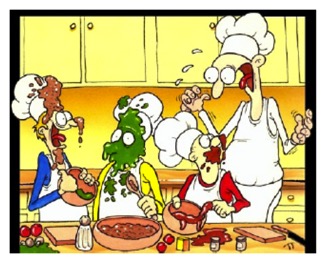Navigating the Holidays

The risk of getting sick at every meal is a huge source of stress and concern. Now let's pile on the stress of family dynamics. We've got the fixings for an epic family battle royal. "Let's get ready to rumble!"
“My family puts the FUN in dysfunction”
I'm sure many can relate to the quote above. If you feel your family is the poster child for dysfunction, do not worry. All families are dysfunctional, it's simply a matter of degree.
Since the dawn of time, our existence has revolved around the acquisition and sharing of food. We have evolved and times have changed, but the primal need to gather and share food with members of our clan still remains. Holiday celebrations are a perfect example of that.
If we dig deep inside and look beyond the medical necessity of our food requests, we will find an emotional component. Our requests are an extension of ourselves. When our family and friends fail to acknowledge our food requests, we feel it as exclusion and rejection of us as a person. Maybe it is, maybe it isn't. Sometimes it's hard to tell what is inside the hearts and minds of our loved ones. I suspect the reasons are many and varied. Perhaps it is fear? Maybe they are afraid to try because they don't want to make us sick? Maybe we've yelled at them one too many times about food selection or preparation? What can we do? We have to talk to them.

Conversations are fueled by curiosity.
Confrontations have an aura of a judicial proceeding.
Conversations frame a problem as something to be solved.
Confrontations have an element of moral superiority.
Conversations happen between equals.
Confrontations shield the confronter from any responsibility.
Conversations say “we’re in this together.
For us today, gluten-free comes as easy as breathing, but it wasn't always that way. We were frustrated and confused, it's reasonable to expect family members will feel the same way. However, their behavior may appear to us as stubborn, unyielding, or uncaring. Remember, listening is a critical component of communication.
Despite our best efforts, we may have to accept the fact that some people just won't get it. This does not mean we can give up, however! Let's face it, we're up against years, decades, or in some cases centuries of traditions. The very definition of tradition allows it to brazenly flip Change, the bird.
Trə-ˈdi-shən: a way of thinking, behaving, or doing something that has been used by the people in a particular group, family, society, etc., for a long time.
"What?! No stuffing inside the turkey? Great-Great Grandma Brunhilde would turn over in her grave if we didn't use her recipe!"
Changing family traditions is downright heresy. Remember, to your family, gluten-free will be the new kid on the block. Situations like this call for the utmost patience. It may take some time for this concept to percolate through their brains and become a newly added family tradition. Don't panic, stay calm, and keep the lines of communication open. Keep up your educational efforts even if its only small tidbits here and there. Sometimes it's best not to flood them with information – ever try to drink from a fire hose?
I wish I had one simple answer that would solve every gluten-free holiday and family situation, but I don't. If I did, my name would be Dr. Phil and I'd have a TV show.
Bottom line – if you cannot resolve any of the food issues, try to put that aside and focus on the people that love and care about you – that is what really matters.
Here are some tips to get you through the holiday season.
- If you are brand new to the gluten-free lifestyle, it might help to have some basic information. Please see GIG of ECW's Gluten-Free Diet Boot Camp article: http://bit.ly/GIGECW_GFBootCamp
- Plain turkey is most generally gluten-free. Read the labels to verify. Several brands will now say "Gluten-Free" or "No Gluten". Make sure it has not been pre-seasoned or marinated; seasonings and marinades may contain gluten. Some turkeys will have a gravy packet. Verify the GF status of the gravy before using. Better yet, ditch the gravy packet and make your own...you'll be glad you did!
- Like turkey, most hams are GF [read the label], however if it has a glaze, it must be checked.
- A list of some gluten-free turkey and ham options: http://bit.ly/GIGECW_Turkeys
- If the turkey has been stuffed with gluten stuffing, do not eat the turkey, it's been contaminated.
- Stuffing [gluten-free or not gluten-free] made inside the turkey is a food safety concern. If you cook the turkey long enough to properly cook the stuffing [to a temperature of 165], the turkey is dry and over done. If you cook the turkey until it's done, the stuffing may not have reached the food safe temperature of 165. Either way, it's not good eats. Make the turkey and stuffing separately.
- Cooking bags are commonly used to help keep meats moist. However, the instructions state a tablespoon of flour should be added to the bag and shaken. The flour prevents the bag from exploding. Ask your host about this ahead of time. FYI - cornstarch or gluten-free flour will work too. [I never knew about exploding bags, we always use a bag and never put flour in it.]
- Mashed potatoes, a GF piece of cake, right? Not so fast, some recipes call for a bit of flour [oh the humanity!]. Scalloped Potatoes is another dish that more than likely has wheat flour. FYI, some potato salad recipes also call for flour. If you don't know how the host prepares their potatoes, it's best to ask.
- Mainstream "cream of" soups are not gluten-free and so are any dishes made with them, [think Green Bean Casserole].
Tomato Soup - Condensed Soup
- Progresso offers their Cream of Mushroom soup, but it's not quite as condensed as actual condensed soup, but with some slight recipe modifications it can be used.
- Cornbreads or corn muffins often times have a mixture of cornmeal and wheat flour. There several mixes that are available. Krusteaz brand has a pretty good cornbread mix that's available in mainstream grocery stores. http://bit.ly/1pAUT9P
- Veggie & fruit trays are always popular. Be sure to survey the neighboring foods and assess cross contamination risks.
- Stay away from the butter dish. It's a crumb magnet!
- Be wary of communal chip or veggie dips. They might not be GF and they could be contaminated due non-GF snacks.
- BYOF (Bring your own food). Bringing a dish to pass ensures you'll have something you know is safe. We may feel a bit guilty about asking others to go out of their way to accommodate our requests. Good news! We have the ability be part of the solution instead of the problem. Politely ask the host what you can bring. Ask them to allow you to help. Let them know you want to ease their work load and worry-factor - not add to it - when it comes to making something safe for you. It helps to know what's on the menu so your dish will fit in with the others. Tip: Make sure you bring plenty for yourself and others.
- Open a line of communication early. It's a delicate topic, but you have to discuss GF food selection and cross contamination concerns with the host if they are not familiar with preparing gluten free dishes. Because they are not immersed in the gluten-free lifestyle, they'll need your help to educate and guide them. The education process is not a "once and done" event, it occurs over time. This is not on their radar 24x7x365, so they will need gentle reminders. Sometimes it's hard for people to grasp, so please be patient if they don't get it right away.
- Enlist the help of an ambassador. Sometimes it's easier to have another person to be an advocate for you. Ask a brother-in-law, sister-in-law, aunt, uncle, or cousin that you trust to help the host find gluten-free options for you. The more family members you have on your team the easier it will be.
- Make sure the hosts know that you appreciate their efforts. Thank them, thank them and thank them again.
- Eat [at least something] before you leave home, it takes the edge off of your hunger.
- If you like to cook, host the celebration yourself. This gives you ultimate control. If the guests ask to bring something, request things that are naturally gluten-free. Veggie tray, fresh fruit tray, an undressed salad, a bottle of wine or other beverages (not beer unless it's GF), vanilla ice cream (suggest a good brand). Don't be afraid to suggest non-food items: festive napkins, folding chairs, family favorite tableware, etc.
- If guests do bring gluten items, have a designated area for GF and NGF dishes.
Inspiration for this article goes to:
Quick Guide to Holiday Family Dining
Celebrate Gluten-Free Newsletter Fall 2014
Gluten Intolerance Group of North America
https://www.gluten.net/product/gig-membership/
25 Tips for handling a GF holiday
Gluten-Free Living - December 2014
http://www.glutenfreeliving.com/
Additional Holiday information…
"Be Our Gluten-Free Guest"
Published November 30, 2017
by Amy Keller, MS, RD, LD
Glutenfreeliving.com
http://bit.ly/2nmqtg3
"Happy, Healthy Holidays - Thanksgiving and Beyond"
Nichol Creach, Gluten Intolerance Group
http://bit.ly/1I0CyM3
“Host your Gluten-Free Holiday”
Gluten-Free Living
http://bit.ly/1j7qQU8
“Top GF Thanksgiving Tips You’ll Need This Week”
The Savvy Celiac
http://bit.ly/1MSjWhI
“Make a Traditional Thanksgiving Menu…Completely Gluten-Free”
Jane Anderson verywell.com
http://abt.cm/1j7s0yV
“18 Tips for GF Bread Baking”
GFJules.com
http://bit.ly/1LmAFUT
“Tackle the Holidays like a Gluten-Free Pro”
Gluten-Free School.com
http://bit.ly/2ArGmUm
“Managing the Holidays with Celiac Disease EP050”
Gluten-Free RN
http://bit.ly/2zZHv8J
Al Klapperich – GIG of ECW Branch Manager
Updated: 12/1/17 - Added Additional Information section
Updated: 11/11/17 - Added Walmart's GF soup info
Lack of Support From Family

Sadly, this state of affairs is very common. In some cases, it goes beyond a simple lack of support, it crosses over into deliberate sabotage or willful "poisoning" of food.
Those that love us the most, can give us the most trouble about our desire to be at our best. This type of behavior is not limited to the gluten free community; it's quite prevalent in many with chronic health issues.
Fear and Denial and Insanity, oh my!
Why would someone that loves us not want to support us in anything we do - let alone something that might improve our health and quality of life? I suspect there are hundreds or thousands of different answers, unique as the fingerprints of those providing the answers. One of the most common opinions from GF community is fear.
Family members are afraid the health problems we are experiencing are closely connected to their own health struggles. If we are correct about the root cause of our troubles, that just might mean they have to go gluten-zero as well. In terms of celiac disease, it's hereditary, no ifs ands or buts. If you have celiac disease there is a 1 in 22 chance that your immediate family members could have it too, although they may not know it. When it comes to Non Celiac Gluten Sensitivity, gluten knows no family lines; it's just plain bad for everyone. Non Celiac Gluten Sensitivity affects a minimum of 6% of the population. Other medical professionals feel it's closer to 10% and as much as 30%-40%.
Denial is a very good friend of fear; you see them hanging together - a lot. Many family members are in denial - "Oh, I can't possibly have what you have - it's the _____________
While most family members would never say it out loud, some would:
While I don't profess to have all the answers [or any for that matter], I do have some things that might help you cope with misguided, uncaring and selfish family members. Like my Father-In-Law used to say "You can pick your friends, you can't pick your relatives".
1) Be clear about why you are going gluten-free.
Have a plan, have goals, direction, be specific. "I am gluten-free because ____________". If you don't have a clear idea about why you are doing it, how are others supposed to understand? Without direction, it's easy to get lost. It's like going on a car trip without a map or a GPS. If you already have a definitive diagnosis - your goal is clear cut - GLUTEN ZERO FOR LIFE - no exceptions - ever. If your family won't take your word for it, show them your doctor's office notes and lab results.
Having a medical diagnosis generally adds credibility to your efforts. If you doing dietary trials on your own without a doctor's backing, you're flying without a net. This means you'll need extra resolve to say the course. Strap yourself in, it's going to be a bumpy ride.
2) Take gluten-free seriously.
Sometimes, we're our own worst enemy. To be successful at being gluten-zero, you need commitment and consistency. There's no crying in baseball and there is no cheating when it comes to gluten-zero; it's all or nothing. If you don't take it seriously, how can you expect others to take you seriously? Seriously. They get confused and frustrated by your actions. One time you're gluten-zero, the next time you're eating a BigMac. That type of behavior just doesn't play, your credibility goes right down the toilet [pun intended].
Be aware that your own loved ones may try to sabotage your efforts. They may try to tempt or persuade you back to gluten foods. How many times have you heard "Come on, just one bite won't hurt". How many times have they waved your favorite gluten filled food under your nose or even tried to force it into your mouth? Giving in to that type of behavior, only gives them control - and makes you sicker. Stand fast and hold your ground. Eventually they should tire of it because you won't give in.
If you are doing dietary trials to see if gluten might be causing problems, clearly define how your trial is going to work. I bring up trials because it may involve putting gluten back into your diet - this might confuse your family members. Make sure they know about your plan. If you think you can cover up cheating under the guise of "doing a trial", you won't get away with it too many times.
Note: Before you start an extensive dietary trial, try to get tested first. In order for the tests to be as accurate as possible, you need to be consuming gluten. Click here for more info on testing.
If you are wondering, a trial should last three to six months at a minimum (six months is better). Depending on your symptoms, it may take a while for them to disappear, particularly neurological or skin [Dermatitis Herpetiformis] symptoms. Sometimes changes are subtle when you remove gluten, but very dramatic when you add it back in. I noticed changes on removal, but noticed larger changes when I went back on gluten. I started a 8 week gluten challenge to get blood work done and called it off after 5 days due to the symptoms. It was enough for me to determine that I will be gluten-zero for the rest of my days. I did have intestinal biopsies taken before I started dietary trials [yes, my testing sequence was reversed], no evidence of tissue damage was found. While I do not have a celiac disease diagnosis, a 4 month trial revealed gluten was an issue for me.
3) Communicate & Educate.
As simple as that sounds, I find it's not always done. Sit down with them and explain exactly why you want to explore gluten-freedom (see Tip #1). Be open about what you desire from them, so they know what to expect, they can't read your mind. Ask them for their help and co-operation; ask them to be a part of your team that makes you the best you you can be.
If we dig deep inside and look beyond the medical necessity of our food requests, we will find an emotional component. Our requests are an extension of ourselves. When our family and friends fail to acknowledge our food requests, we feel it as exclusion and rejection of us as a person. Maybe it is, maybe it isn't. Sometimes it's hard to tell what is inside the hearts and minds of our loved ones.
Opening up a line of communication is so important when it comes to resolution. Having a calm, heartfelt conversation about our health concerns and what it takes for us to be healthy and happy is the best chance we have at getting them to understand. It is up to us to kindly and respectfully educate them on how to do things correctly, no one else will do it.
I invite you to read this informative article on Confrontations vs Conversations from PsychCentral: http://bit.ly/1GQw2q1 It offers some great insights…
Conversations are fueled by curiosity.
Confrontations have an aura of a judicial proceeding.
Conversations frame a problem as something to be solved.
Confrontations have an element of moral superiority.
Conversations happen between equals.
Confrontations shield the confronter from any responsibility.
Conversations say “we’re in this together.
If you have trouble expressing yourself verbally, write a letter. Explain to them exactly how you feel, explain what you go thru on a daily basis, how you'd like to get your life back on track and how much it would mean to you to have their support.
Often times people tend to ridicule or dismiss things that they don't understand. If they are open to learning, find information from a reliable website and share it with them. Try not to overwhelm them with too much information. Once their eyes glaze over, you've lost them.
You might find something helpful here:
http://www.gigofecw.org/news/files/educating_about_gluten_free.php
http://www.gluten.net/resources/educational-bulletins
4) Letting go
Let's face it, you might talk and educate until you are blue in the face, there's a possibility they still won't get it. Be confident in the fact that you gave it your best effort. Don't let your emotions consume you over their unwillingness to support you. As hard as it may be, you'll be better off if you just accept it and keep moving forward, focus on getting yourself healthy. Don't let them suck you into their darkness.
5) If support doesn't come to you, you go to the support
OK, so maybe your family is a poster-child for dysfunction; incapable of understanding what you're going thru, refusing to work with you on any level...you need to seek out those that understand and have walked in your shoes. Connecting with others that share similar experiences can make the difference between success and failure.
It's imperative to surround yourself with people who are positive and who are pursuing their own goals. Positivity is contagious - so is loneliness and depression - which would you rather be? Dr. Barbara Fredrickson found a Positivity Ratio of 3:1 a tipping point for human flourishing. This means for every negative feeling, thought, experience, we need a minimum of three positive (love, joy, gratitude, etc) in order to be happy. The ideal ratio is 5:1.
Support comes in many different ways. Today, there is a seemingly endless supply of online communities you can join. The great thing about online communities is that they're always open - ready to accept the latest rant or cheer your most recent accomplishment. If online is not your bailiwick, a local support group is the way to go. While online groups can do wonderful things, nothing beats face-to-face contact. It's hard to replace seeing the look on someone's face, the sound of their voice, and at times, the touch of a hand or hug.
Search for local support groups here:
http://www.gigofecw.org/support/supportgroupwebsites/supportgroupwebsites.html
Good luck in your journey!
Al
This article was published in Gluten Intolerance Group of North America's Quarterly Magazine Celebrate Gluten-Free Sping 2013
Update 03/13/15: Update Tip #2 Communicate & Educate - added Conversations vs Confrontations.
Update 11/23/12: Fixed typos and added additional information.
Educating family & friends about gluten-free

Easter is only one week away. In many families, this means Easter Dinner at someone's house other than your own. Oh the humanity...
~~
Not only was today Palm Sunday, but it was also First Communion in our church. The kitchen and fellowship hall was a-buzz with activity.
A family was holding their First Communion celebration in the fellowship hall and everyone was bringing their contributions to the feast: deviled eggs, sliced ham, calico beans, sloppy joes, cakes, pies and desserts of all types. OH MY!
As I was watching all of this food pour in, I'm thinking...OMG what a gluten-free nightmare...
Peg and I were in the kitchen cleaning up from communion, we were invited to take part in celebratory feast. A family member knows I am gluten-free and said "Oh gosh, I'm sorry, we don't have any gluten-free buns, but there's plenty of other things for you...". We politely declined, but really appreciated the heartfelt invitation.
Dining out in a restaurant is hard, but I think eating at someone's house or a hosted event is even harder. Most times the host/hostess are unfamiliar with the gluten-free diet and the concept of cross contamination. Even professionally trained chefs may not always know the ins-and-outs of a gluten-free diet.

I don't blame friends, family and loved ones for not knowing about gluten-free. In fact, it's our [the gluten-free community] responsibility to impart that knowledge to them. If we don't do the education, who will?
In the end, if the people in our lives do not know how to accommodate our needs, we have no one else to blame but ourselves - to a certain degree.
Of course there are some people that just don't get it no matter how hard we try. If we've done our best to educate and it is just not sticking - at least we gave it our best shot. Sometimes family can be the hardest to get through to.
The whole education process doesn't happen overnight. Of course, we have to make allowances [bring our own food, eat before hand, etc] until we are comfortable in their knowledge and abilities. Sadly, in some cases, that day may never come, despite our best efforts.
Since 2003, I've had a lot of "educational opportunities" with our friends and family. They now know and understand cross contamination, they will verify products/ingredients with me, even save the labels for me to inspect. My family and friends have been very good about learning and making things safe for me. I connect with enough of the gluten-free community to know their behavior is not the norm. I am lucky...or...have I simply done a good job at educating them. I suspect it's a little of both.
Even though my family and friends are very good, I always bring at least one dish that I know is safe. Often times, I'll bring a second dish of the same food just for me that won't be put out for the masses. Also, we try to host as many family events as we can so we have as much control as possible.
I'd like to share some of the tools I've used to educate my friends and family members....
BeyondCeliac.org: Seriously, Celiac Disease - This is an effort to educate non-diagnosed family members about the importance of getting tested. As we’ve [often] discussed, our own families can be the most difficult. We talk, we educate, we lead by example. Whatever we do, has no affect. They just don’t listen to us. Celiac disease is genetic, it runs in families. If one person in the family has it, there is a chance someone else in the family has it too (1 in 22 for a mother/father/sibling) - they may not even know it. It’s very possible they could have it, and not have any symptoms at all! Be aware a single negative test does not clear a person for life. Celiac Disease can be triggered at any age - at any time. And so the struggle begins… Family members need to be tested, but getting them to do it is another story. This is where Seriously, Celiac Disease campaign comes in.
Living Gluten Free for Dummies by Danna Korn - I highly recommend this book. I see this book as a continuation or update of her Wheat free Worry Free book. It also goes a bit further in depth on certain subjects. There is no need to own both. Get this one if you don't have either book. Again, a great book to loan out.
Wheat Free Worry Free by Danna Korn - I got this book shortly after I went GF. Danna has a great persona in her books. Her style is very conversational, easy to read and fun! She includes humor in her books, which I think is a great idea. This is a great book to give to friends and loved ones. Often times they have a hard time understanding what you're going thru and why you have to do it. I lent this to my Mom, after that, she seemed to "get it"...or at least stopped questioning why I couldn't have ___________ ;).
A Celiac is Coming For Dinner - This is a nice article from Caryn Taity about accommodating gluten-free guests. I have given this article to several family and friends.
Cooking for Gluten-Free Family or Friends - Amy Leger [aka The Savvy Celiac], covers some of the basics.
Gluten-Free Diet Boot Camp - I often get asked for information on celiac disease and gluten-free. Either it's someone that is just starting to investigate gluten as the source of their health issues, or it's someone that is just newly diagnosed and looking how/where to start. This is a collection of many different links.
A Guide to Gluten Cross Contamination - This guide strictly addresses areas of gluten cross contamination and how to minimize the risk.
A Day in the Life - Living in a Mixed House - This is an article I had written several years ago for this support group. It explains how we handle having gluten in the house. This is knowledge and experience I have gained over the years - much of it I've imparted to friends and family members.
So, You Want to Bake Gluten-Free Cookies - I created this for a few non-gluten-free people that wanted to bake GF cookies. We put together a GF Cookie Baking Kit: This document that included the recipes, the proper amount of GF flour for a specific amount of cookies. I cover the basics of gluten, gluten-free baking and cross contamination - enough information so they can safely make GF cookies for someone. Note: You can tell by the logo, this was done before we became a Gluten Intolerance Group branch in May 2011
Celiac Disease - Stuff you should know, but didn't know to ask - A presentation I did for our church. Since our Pastor is also gluten-free I wanted to educate the other members. This presentation covers the history of celiac disease, what it is, what is gluten, is there a safe amount of gluten, cross contamination. Our church now has a completely gluten-free communion. Since the host is gluten-free so there is no chance of cross contamination. Note: You can tell by the logo, this was done before we became a Gluten Intolerance Group branch in May 2011
Updated:
12/16/16 - Added BeyondCeliac.org's Seriously, Celiac Disease
10/29/13 - Added Gluten-Free Diet Camp.
6/24/2013 - Added Guide to Gluten Cross Contamination.